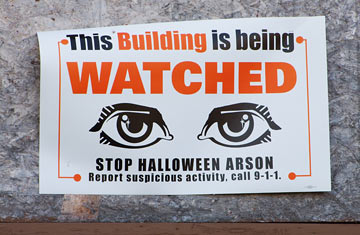
Signs like this one have been placed on buildings that are regarded as susceptible to arson on "Devil's Night" in Detroit.
A dying auto industry, failing schools, rampant unemployment and a home foreclosure crisis: Detroit has no shortage of ills, but in recent years it has made progress combating the city's notorious tradition known as Devil's Night, the period leading up Halloween each year when scores of buildings would be torched. Yet earlier this month, when nearly a dozen vacant homes were set afire in the span of a weekend, authorities here feared the worst: The real estate crisis that has hit Detroit particularly hard would mean a resurgence of Devil's Night.
Locals are working hard, however, to not allow that to happen. Thousands of people from across the country — including Guardian Angles from New York City — are arriving to patrol, hoping to prevent the burning of vacant buildings and cars. Many residents will sit on their front porches, watching for prospective arsonists. Wooden boards have been placed across the doors and windows of vacant buildings to keep out intruders. On street posts and buildings across the city, there are signs saying, "THIS BUILDING IS BEING WATCHED," above a sketch of a set of human eyes. "Obviously, I'm nervous," Detroit's mayor, Dave Bing, said in an interview earlier this week, when asked about the possibility that homes here may become targets for arsonists as Halloween approached. "But we need to be observant, and I think our community has gotten engaged."
Detroit officials are taking a number of steps to thwart the risk of arson. The city's fire department, for instance, has canceled off-days for most of its workforce, which has seen its ranks dwindle from 1,325 a decade ago to about 1,098 because of Detroit's financial crisis. As a result, the fire department has been overwhelmed protecting a vast territory. Bing himself visited several fire stations, restaurants and community centers in recent days to encourage residents to be vigilant about reporting suspected arsons.
The exact origin of Devil's Night is unclear. People who grew up in Detroit following World War II recall kids plastering cars with toilet paper, and tossing onto porches fiery paper bags filled with feces. Huge swaths of this city burned during the 1967 riots, leaving the kind of blighted property that experts say lures prospective arsonists. John Hall, a researcher at the National Fire Prevention Association, said the presence of so many vacant properties presented the ingredients for what's known as "the broken windows syndrome." He says "when people see a collection of abandoned properties in one location, graffiti goes up. The general perception is, 'We've lost control of our neighborhood.' It's infectious." During the 1960s riots, parts of cities like Newark, Chicago and Los Angeles were torched. But those cities never developed a tradition like Detroit's Devil's Night.
In the 1990s, then-mayor Dennis Archer Sr. tried to rebrand the Halloween period "Angels' Night." His police chief at the time, Isaiah McKinnon, recalls getting at least 30,000 people to turn on the lights of their homes and patrol their neighborhood's streets, to deter prospective arsonists. It worked: incidents of arsons fell sharply. "You felt a sense of relief," McKinnon says.
So far, there is little evidence that the significant number of vacant homes due to the real estate crisis has led to a surge in arson across the country; incidents of arson have been fairly constant over the years nationwide, according to the National Fire Prevention Association. Still, officials here and elsewhere have been concerned that more owners of foreclosed properties would torch their homes to collect insurance money. Even this city's suburban residents, in past years, have driven cars they could no longer afford into the city, and torched them for insurance purposes.
Among the groups trying to thwart any new wave of arson in Detroit this Halloween is Blight Busters, which expects some 500 volunteers to patrol Friday night in one of this city's neighborhoods. In recent years, the group says it has torn down some 300 abandoned homes. Says John George, executive director of Blight Busters: "We now celebrate Detroit on Angels' Night."
